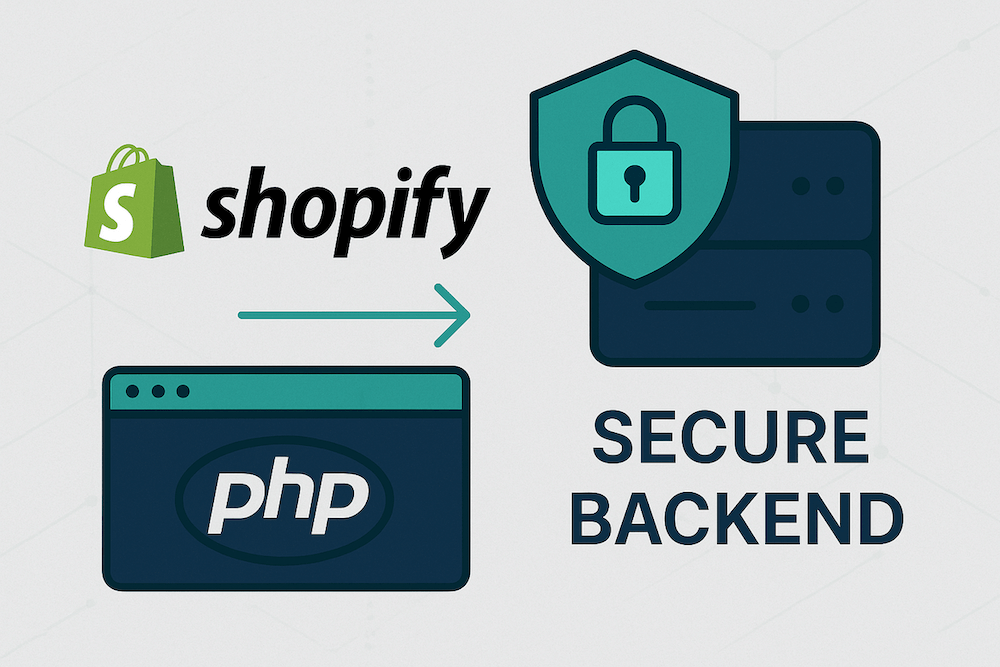Solving Shopify CORS Errors with App Proxy and Secure PHP API Integration

Overview
A merchant operating multiple Shopify storefronts needed a reliable way to validate customer emails before activating accounts. They were using a custom PHP script triggered from a Shopify theme, but recent security changes by Shopify caused the solution to break. I was brought in to rebuild the integration using a secure and scalable approach that works across stores—without exposing sensitive data or depending on deprecated methods.
The Challenge
The original system relied on client-side JavaScript calling a remote PHP script using fetch(). This script queried Shopify’s Admin API to check if a customer existed, but it broke due to:
- CORS errors: Shopify's frontend environment blocked the cross-origin requests.
- Security risks: Shopify tokens were passed via custom headers, visible in browser dev tools.
- Lack of multi-store support: The script couldn’t dynamically route requests to the right store’s API token.
This created friction for new customers trying to activate their accounts and posed a security liability for the merchant.
Solution Design
To rebuild the system, I leveraged Shopify’s built-in App Proxy mechanism, which allows authenticated server-side routing of theme-based requests to a secure external endpoint. This method:
- Prevents CORS errors by avoiding browser-based cross-origin calls.
- Hides sensitive tokens from the frontend.
- Scales easily across multiple Shopify stores.
I also rewrote both the frontend and backend logic to improve robustness and maintainability.
Key Updates
- Registered an App Proxy that routes storefront requests to
https://api.example.com/shopify/customer-activate.php. - Modified frontend logic: Created a new
getCustomerData()JavaScript function that sends POST requests with the customer’s email securely in the body. - Removed insecure headers: Eliminated the use of custom HTTP headers that exposed tokens.
- Enhanced PHP script:
- Accepts JSON input.
- Detects which store made the request using a
Shopify-Siteheader. - Matches the correct API token dynamically.
- Improved error handling and made it compatible with PHP 7.2.
Technical Highlights
- Secure server-side routing through Shopify App Proxy.
- Theme code isolation using a dedicated function for activation logic in
account-activation.liquid. - Improved server compatibility by rewriting parts of the legacy PHP code.
- Multi-store detection and token assignment based on request headers.
Tech Stack
| Component | Purpose |
|---|---|
| Shopify (Liquid, Admin API) | Shopify integration |
| PHP 7.2+ | Backend scripting |
| REST APIs | API communication |
| JavaScript (Fetch API) | Frontend logic |
| Remote Hosting (e.g., api.example.com) | Hosting |
Results
- CORS issues resolved: The system now works natively within Shopify themes.
- Sensitive data protected: Tokens and internal logic are hidden from the public.
- Multi-store support enabled: The system handles customer activation from multiple Shopify stores seamlessly.
- Better customer experience: Error handling improvements give users clear feedback when activation fails.
Why It Matters to eCommerce Managers
For eCommerce managers, especially those managing wholesale workflows or multi-brand Shopify instances, this case is a reminder of how platform-level security updates can disrupt key flows.
By rebuilding this activation system to use secure, Shopify-approved methods:
- Customer onboarding became seamless again
- Technical debt was eliminated
- Maintenance overhead was reduced
And most importantly, customer trust and operational continuity were preserved.